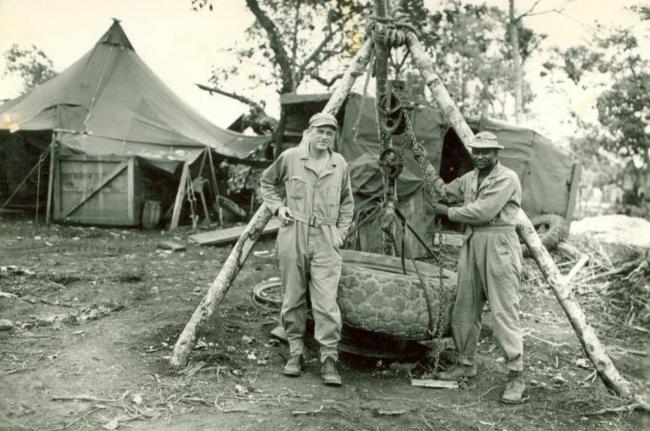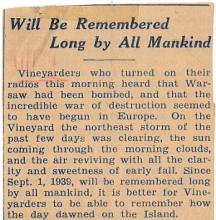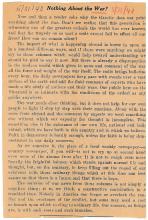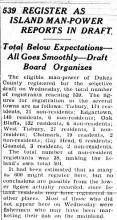As the planes swooped and roared past the windows of his home, the young Army officer, seeing the big red suns which marked them - for the great power which sent them on their errand still thought then that the sun was rising on the land it ruled - cried out: “It’s Japan! It’s war!”
He had been having a leisurely breakfast at his house on Hickam Field, a half block from Pearl Harbor, and had just finished seeing to the breakfast for his seven months old son, when the attack came. He tumbled into his clothes and “rushed to the line,” for he had a squadron out on the field, and it was his hopeless task to try to get the planes up in the face of the bombardment from the air. Later on, he did accomplish it. He left behind in his house, his wife and his baby son, Alan Kepler. They did not meet again for several days.
Now the young officer is a colonel in the Air Corps, on combat duty somewhere in the Pacific, and his wife, Mrs. William J. Holzapfel Jr., and his son Alan are spending a month on the Vineyard, whose peace and security furnish so startling a contrast to the life on another island from which they were forced to flee a year and a half ago. Mrs.. Holzapfel chose the Vineyard for a vacation “because I had heard so much about it, and I’d never been here and I wanted to see what it was like”.
Tense with the Strain
Her story of the experiences of one family in the Pearl Harbor horror was told for the first time for publication on Saturday. She had been besieged by papers in her home town of Dayton, Ohio, and in other places, to relate her experience, but the memory of them was too close and too poignant, and, at first, there was too much danger of revealing something the enemy would like to know. Even now, many months later, she grows tense with the strain of a remembered experience, and there is cold anger in her voice as she describes the attack from the sky. And she is still cautious about what she reveals.
While little Alan pursued his active way around the Gazette office - no delayed shock reaction for him, though Matrix, the Gazette collie, who towers above him, suffered from shock in escaping from his blandishments - Mrs. Holzapfel continued with the tale of one red letter day, the red this time standing for the blood which flowed from many victims of Japan.
What did she do after her husband left the house? Had she a servant to keep the vigil with her? Was she frightened? She waved aside these questions a little impatiently. She is a self possessed young woman, the kind who is equal to the emergencies of life and death. There was no maid, for it was impossible to get servants, since the WPA was going strong in the islands and there were other government projects offering attractive wages. She wasn’t frightened, in fact one gathers that she was too angry to think of herself.
As one explosion followed another, young Alan sat up in his crib and jumped up and down and called to her in baby language she could understand. She made sure that he was safe by depositing him under the grand piano, which would have been the safest place if the house had been hit. But it wasn’t. Other houses in the block had bullet holes, and after it was all over she went out in the backyard and collected a bushel basket of shrapnel fragments and bullets, some of which she brought home as souvenirs.
Lying on the floor she looked out and watched the Japanese machine-gunning the houses, and the tiles flying off the nearby roofs. And out over Pearl Harbor, hidden in ominous clouds of black smoke, she saw the battle in the clouds, and saw two Japanese fighters go down in flames. Deafening explosions came from Pearl Harbor on one side and from “our hangar fire” on the other side. As everyone knows, the Japanese attacked all the fields at once.
Like an Earthquake
The sensation from the bombing was like that caused by an earthquake. The chandeliers swung madly, the walls seemed to wabble, but the house stood and its occupants were unharmed. Others were not so fortunate, and the sergeants’ houses, which were in the direct line of flight, were badly damaged.
There was no hysteria even after the bombing was ended and strained nerves might have been expected to crack. The women and children “were as calm as mice.” Later that morning, only hours later really in a yearlong day, she and Alan, riding in a car owned by a neighbor across the street, left their home to take refuge in the hills with a Hawaiian family, who sheltered fifteen Americans for days, with unfailing courtesy.
“The Hawaiians are the most hospitable people I ever met, and the most gracious. I can’t say enough nice things about them. And they have the most beautiful smiles. They’re completely genuine.” And there was warmth in her own voice as she spoke.
Their refuge in the hills was near the famed Pali. Mrs. Holzapfel was surprised that everybody didn’t know about the Pali, a path, tortuous and dangerous, between the mountain ranges. Tradition says that when one of the early kings won a battle, he made the troops of the leader who had led the uprising, jump off the path and over the cliffs, it is so windy there sometimes, she says, that people have jumped or fallen off the path and been blown back again. It was over the Pali, one dark night, that her husband managed to visit her and to make sure that all was well.
After a week or so, Mrs. Holzapfel returned to Hickam Field, a sadly different field. It had been decided that she should return to the United States as soon as transportation was available, and she and Alan were among the 4,000 Americans, mostly Army wives and children, awaiting transportation on the clipper. It was Jan. 19 before their turn came, and the next day they were in San Francisco.
One gathers that the horrors of the attack were only a few degrees worse than the clipper trip, with the ship loaded with forty-five passengers, requiring three sittings at meal time, and with most people too air sick to care for the excellent food served by two male stewards, or for life itself. No one went to bed, of course. The trip was made in record breaking time, under the most adverse of weather conditions, and its completion was just one more reason for thankfulness at setting foot in the United States.
Homeward Bound
Only fifteen pounds of baggage were allowed to a passenger, and Alan’s necessities left little room for anything for his mother. She waited in San Francisco until the rest of her baggage and her car were brought over by steamer, then drove home in a leisurely way, along the southern route to Dayton.
Mrs. Holzapfel, a graduate of the School of Journalism, University of Missouri, was in complete charge of a radio hour in Janesville, Wis., near her former home of Racine, before her marriage to the flying colonel, who was graduated from West Point in 1934. Her caution and her reminders that this or that of her revelations must not be printed, were chiefly because of her husband and his career.
But she did say that he had taken part in the raid on Wake Island, and piloted a bomber in the raid on Nauru, one of the Japanese-held islands in the Gilbert group. It was in this raid that the high-ranking officers of the Air Corps had their “fun,” and took part actively indeed. Colonel Holzapfel, for instance, had a general for his waist gunner. An Associated Press man also rode in his plane and mentioned the colonel by name in the report of his experience.
The colonel has been in this country since the war began, but only briefly, and not for a long time. But he has been able to take out in action the feeling born in the Pearl Harbor attack, while his wife has had the memory of it burning deeper and deeper. She knew before she left Pearl Harbor how far from complete the government’s revelation of the damage done to the fleet had been, for she had seen the battered vessels when she visited Ford Island. But not until long after the President told all did she admit that she knew it, and even now, in the best tradition of an Army wife, she draws a veil of secrecy over some of the experiences she lived through, only less dense than the pall of smoke which rose over Pearl Harbor Dec. 7, 1941.











Comments